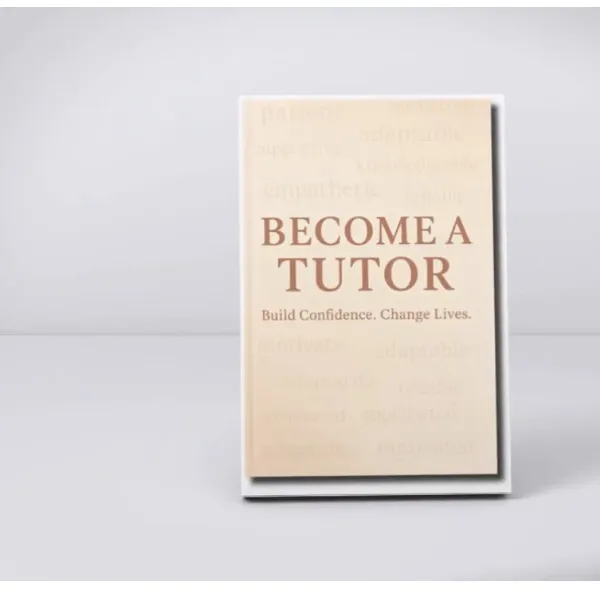
Voicing the question: “How do I become a tutor?” is terrifying because it starts to make your inner thoughts a reality
People are now aware of what you’re thinking, and that’s huge!
But it is a key question that needs to be answered regardless of your background or your starting place.
When a friend suggested I had a go at tutoring back in 2012, my initial thoughts were that I couldn’t because I’m not a qualified teacher. She pointed out that neither was she.
My next excuse in my mind was, what if people judge me because I’m not a teacher? I was asked what’s the worst that could happen? I could fail and I will make a complete fool of myself.
Okay, what is the best thing that could happen if you go ahead? I do a good job and get to help children achieve their goals in a way that works for them…As it’s turned out, over the years, as a company we have supported hundreds of children achieve their goals.
Ask yourself, what is the worst thing that could happen if you decided to become a tutor?
And what, could be the best thing that could happen? And if you don’t think about all those children who have missed out because you didn’t give it a go.
If you'd rather watch a video version of the article click here
How Do I Become a Tutor?
What Do Tutors Actually Do?
What tutoring entails will vary considerably with every family that you visit, with some families you may be asked to support the child with their homework, with others you might need to offer refreshers as to how you do something. The next child might need something explaining from scratch.
How you present this will also vary wildly. For some it may be a provision of worksheets that you allow them to work through, for others you might figuratively speaking hold their hands and guide them through the worksheet, breaking things down and explaining it as you go. Other children will need something more interactive and creative to help them to retain the knowledge and information. How you present your lessons will be entirely at your discretion (though, obviously if you work for a company or purchase a tutoring franchise you will be expected to follow their systems) but the goal in any situation is that the child is feeling more knowledgeable and confident when you leave than they did when you started.
The final sentence of that last paragraph is key. For virtually every child you ever work with, supporting them with their confidence, offering confidence and being patient is as, or potentially more important than any academic support that you may offer.
One of the first lads I ever went to was just meant to be for the summer holidays. They lived a good 45 minutes away from where we were living and I was only charging £10 (this is going back many years!)
The first week I turned up, the mum invited me in, and the lad, about 5 years old, sat at the table head down looking like he wanted to cry. I introduced myself and showed him the games I had with me. The mum had mentioned that he liked cars and maps, so I had created a game where you moved around the street and answered the questions as you went.
By the end of the first lesson, he looked quite proud of the stickers he had earned.
When I arrived the following week he came to the door with his mum, though he was sheepishly stood behind her.
By week 3, he was sitting on the doorstep waiting for me.
So many times, the conversation I have with parents is about lacking confidence. I am sure that if we can boost their confidence in one area, it will trickle into other areas of their lives as well.
Maybe giving that is as important as the knowledge that we provide.
Do I Need Qualifications to Be a Tutor?
As it stands in the UK at the moment no formal qualifications are required to become a tutor, which can be a double edged sward, making it easier to commit to being a tutor but devaluing what is offered as many people perceive it as something done by students to earn “a little bit of extra money” rather than a credible job.
Although you don’t need a formal teaching qualification, relevant experience or knowledge will be beneficial. You will also need to ensure that you hold an up-to-date DBS check, and I would also recommend having business liability insurance.
Again, although no formal qualifications are required qualities like patience, communication, and the ability to explain gently and clearly are hugely necessary. If you need to explain things a dozen times, so be it.
We can not get frustrated or annoyed, instead we need to look at ourselves and consider if we are just repeating ourselves or are we explaining it differently each time. It can be challenging, but that is our responsibility, to ensure that they understand. We need to adapt to them and not expect them to adapt to us.

If you are patient things will grow. Word of mouth, reputation and persistence will help you to build a steady stream of students.
What Subjects or Ages Could I Tutor?
Tutors are required for many subjects, though the core academic ones are the ones which are most widely sought after. What are your strengths and experiences? Could these be adapted to supporting a child through tutoring.
You may choose to support a very niche subject such as times tables or reading. This can be hugely powerful as the times tables are at the foundations of nearly everything the child will explore later on in maths and with the UK government setting “The multiplication tables check (MTC)” as a legal requirement for all year 4 pupils registered at state-funded maintained schools, special schools or academies, including free schools, in England the focus on times tables is huge.
How Do I Get Started Practically?
As mentioned previously a DBS check (if UK-based) will be beneficial. Again, it is not compulsory as such, but many parents will ask to see it and it also provides evidence that you are both professional and trustworthy.
Decide what level and subjects you want to offer. Although you may not start as niche as purely offering the times tables, you don’t want to be too broad either. You want to become known as a specialist in a subject rather than a “Jack of all trades”. An analogy often used is if you were looking for a brain surgeon you would not ask the General Practitioner. Although this is an extreme example it emphasises the logic.
Where do you feel most confident starting: online or in-person? Prior to lockdown all our lessons took place in person in the child’s home. My logic was that if the child was expected to go to a new environment, with a new person to study something they felt they lacked confidence or ability in they would be less likely to perform at their full potential. However, if we were able to eliminate just one of those (the unfamiliar environment) the child would be in a better mindset to learn.
However, along came Covid and during lockdown, we were no longer able to go into people’s homes. So, at this point the business turned direction and started offering online lessons. It took a few days for them to be running smoothly, but we did it and became a stronger business because of it.
It means that we can now offer a 2-tierd structure, either online or in the comfort of their own home.
Once you have a plan in place let people know you’re available (family, friends, school mums), you never know who they know that you can potentially reach out to that might be looking for exactly what you are hoping to offer.
What If I Don’t Feel Ready Yet?
Feeling nervous is normal. Starting something new is terrifying!
The first lesson I ever went to, I was told go to the crossroads, turn left, keep going and the cottage was right at the end of the lane.
Simple.
I followed the directions and pulled up outside this large house. It didn’t look like a cottage, but I guessed we all perceived things differently. A lady came marching out and asked what I wanted.
I explained that I was there to see her daughter. I was the tutor, Dawn.
She told me I had the wrong house, I apologized profusely, as she clearly wasn’t impressed that I was there and got back in the car.
I was already a bag of nerves. Now I just wanted to cry. I wasn’t sure that I wanted to tutor anyway. What if I wasn’t good enough? What if they shouted at me for not delivering what they wanted? What if…?
As I pulled out of their drive, I noticed a small cottage tucked away behind some trees. That must be it.
Should I knock or just drive home and forget the whole stupid idea.
I got out of the car. Grabbed my bags from the boot, put a smile on my face and knocked.
The rest of the story as they say is history.
I suspect you probably have your own what if’s. I think we all do. But building the business has been a series of small steps: helping one child, then another, and another. I’ve had mentors and joined communities where I could celebrate and rant. I’ve read books and taken courses. In themselves, many of the steps I have taken have seemed insignificant, but the accumulation of all the steps over the years has made the business something far better than I could ever have imagined.
Common Misconceptions
There are many misconceptions around tutoring: “Tutors need to be perfect” To be honest, I would suggest that if you explain to the child that there may be things that you’re not sure about, but you can explore them and learn together, or you can find out and cover it in the next lesson, demonstrates that it’s actually ok not to know things. I suspect there is no person on this planet that knows everything.
Again, there may be gaps in the curriculum that you are not familiar with, but that’s ok, you don’t need to know the whole thing. We often don’t follow the curriculum that closely, instead we follow the needs of the individual. We focus on what they need and at their pace rather than following a generic curriculum. This way we can go at their pace and focus in more depth in areas where they need the extra support.
Tutoring is bizarre as some people believe that “only ex-teachers can do this” whereas others perceive it as being something that students do to earn a little extra money to support their studies. To be honest, neither is true. The biggest requirement is that you are patient and willing to offer support in a way that is relevant to them.
I have had some amazing teachers work with me. But I have also had teachers who have struggled to work one-to-one. They are taught to teach to the “masses” to the average child rather than to the individual. The qualification isn’t what is important, it is the attitude, care and skills of the individual.
The Heart Behind Tutoring
Many tutors begin not because they set out to “become a tutor”, but because they wanted to help. It may be that they went into a school class to help listen to readers and it grew from there. Or they helped a neighbour, niece, nephew, brother, sister, son, daughter and it grew from there. It wasn’t intended, it just happened.
You never quite realise the impact that supporting a child can have and how that impact has a ripple effect that can continue for years, impacting the rest of their lives:
Hi Dawn
I wanted to say a huge ginormous thank you to you for everything you've done for F. You have helped him so much in his maths and English. But for him it's more than that. Before starting with you he was in a really bad place. He felt education wasn't for him and had no hope of passing anything or achieving anything. But by teaching him maths in a way he understood he started to believe that he wasn't totally stupid and maybe he could pass. And then that spiralled as he got better at maths, he starting thinking he could maybe do other things and it's really changed his whole outlook. I never thought I’d be sitting here with him discussing A levels let alone him considering going to college after 6th form to studying computing. He is like a different person!
So, a huge thank you from all of us and we will let you know how he gets on.
I hope you have a wonderful summer!
(He got a level 8 in maths).

Just some of the kind words said about Clara James over the years
So, What comes next?
What’s Next?
If you’re still reading this, maybe tutoring is already calling to you and you are considering your next steps.
Maybe that will be taking a course, joining a community, reading more to learn more about what you “getting into”.
I wish you the best of luck.
Copywrite: Clara James Tutoring 2025

